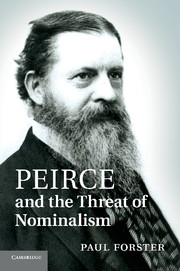Book contents
- Frontmatter
- Contents
- Preface
- List of abbreviations
- 1 Nominalism as demonic doctrine
- 2 Logic, philosophy and the special sciences
- 3 Continuity and the problem of universals
- 4 Continuity and meaning: Peirce's pragmatic maxim
- 5 Logical foundations of Peirce's pragmatic maxim
- 6 Experience and its role in inquiry
- 7 Inquiry as self-corrective
- 8 Theories of truth: Peirce versus the nominalists
- 9 Order out of chaos: Peirce's evolutionary cosmology
- 10 A universe of chance: foundations of Peirce's indeterminism
- 11 From inquiry to ethics: the pursuit of truth as moral ideal
- Bibliography
- Index
10 - A universe of chance: foundations of Peirce's indeterminism
Published online by Cambridge University Press: 28 April 2011
- Frontmatter
- Contents
- Preface
- List of abbreviations
- 1 Nominalism as demonic doctrine
- 2 Logic, philosophy and the special sciences
- 3 Continuity and the problem of universals
- 4 Continuity and meaning: Peirce's pragmatic maxim
- 5 Logical foundations of Peirce's pragmatic maxim
- 6 Experience and its role in inquiry
- 7 Inquiry as self-corrective
- 8 Theories of truth: Peirce versus the nominalists
- 9 Order out of chaos: Peirce's evolutionary cosmology
- 10 A universe of chance: foundations of Peirce's indeterminism
- 11 From inquiry to ethics: the pursuit of truth as moral ideal
- Bibliography
- Index
Summary
In the previous chapter I explained the connection between Peirce's cosmology and his theory of inquiry. I argued that he arrives at his views about the origins and evolution of the universe by thinking through the implications of the hypothesis that laws are real, in light of the principles of his theory of inquiry. Proceeding in this way, Peirce concludes that not only does each law in the universe require explanation but so too does the emergence of lawfulness out of ‘nullity’. On the theory he develops, laws result from the working out of a tendency to generalize events that happen by chance. For him, then, ‘tychism’ – his term for the view that chance is operative in the order of things – forms a central part of the hypothesis that laws are real.
As Peirce sees it, tychism is contrary to nominalism. The nominalist holds that the objective content of knowledge can be reduced to claims about individuals. To Peirce's way of thinking, this limits the scope of knowledge to claims about what exists and leads the nominalist to deny ontological significance to claims about what is possible (i.e. what might be), probable (i.e. what is likely to be) or necessary (i.e. what must be). The nominalist denies, in particular, that statistical generalizations in science – lawlike claims involving probabilities – represent real statistical principles operating in the world.
- Type
- Chapter
- Information
- Peirce and the Threat of Nominalism , pp. 205 - 231Publisher: Cambridge University PressPrint publication year: 2011



